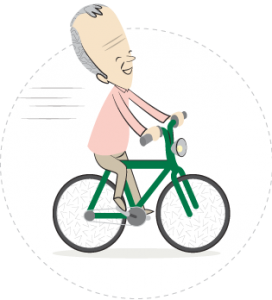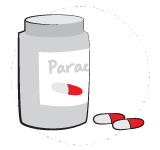Financial, legal and lifestyle news for older citizens April 2021

Our regular round-up of news and views affecting seniors and their families. This issue includes
- High street banking
- Job losses
- Landline phones
- Scam alerts
- Risky investments
- Life after dementia diagnosis
- Alcohol and the lockdown
- Vitamins, exercise and Covid-19
- Vaccine side-effects
- Care award winners
- Managing chronic pain
 Getting banking back into the high street
Getting banking back into the high street
Here’s a good idea. Instead of closing completely, five banks in Rochford in Essex are sharing premises, each opening one day a week. There’s also a Post Office counter. The bank hubs are also being tried out in Cambusland, on the outskirts of Glasgow. The banks aren’t currently offering a full range of banking services, but any face-to-face contact to help customers is to be welcomed back. It’s particularly good news given than many banks cut their opening hours last March in the face of the pandemic and have shown little inclination to return to full-day opening.
Older workers are losing their jobs
The pandemic has seen the biggest drop in jobs for the over-50s since the 1980s, according to a report from the Resolution Foundation. And, having lost their jobs, this age group is taking the longest to find new employment. Young people continue to be the hardest hit though.
Landline phones are not being used
 A survey suggests that landline use is on the way out. Does this matter? Many older telephone users have become adept at mobile phone use, and have joined in the videoconferencing trend during lockdown to keep in touch. And not using a home handset has the added benefit of not having to answer the phone to scammers, who continue to be an increasing problem.
A survey suggests that landline use is on the way out. Does this matter? Many older telephone users have become adept at mobile phone use, and have joined in the videoconferencing trend during lockdown to keep in touch. And not using a home handset has the added benefit of not having to answer the phone to scammers, who continue to be an increasing problem.
Keeping up with the latest scams
Talking of scammers, Which? provides a very useful scam alert service, which tracks the latest scams and offers advice for avoiding them. You can also sign up for neighbourhood alerts about local policing and safety issues, via email and an app on a local basis.
 Risky investments are more popular
Risky investments are more popular
Older people are being tempted into ‘risky’ investments, a new study from the Financial Services Compensation Scheme has revealed. Looking at the investment choices of people aged 55-75, the study found that retirees are being tempted by investments they wouldn’t normally consider because of the current low levels of interest rates. The FSCS points out that investors can check whether products are FSCS-protected, using a checker on its website.
Dementia diagnosis – what happens next?
The Alzheimer’s Society has updated its dementia guide for people who have recently received a dementia diagnosis. The guide covers topics such as treatments, living well, planning ahead, available services and useful contacts. It can be downloaded or ordered as a free publication by post.
Alcohol is affecting us differently post-lockdown
We’re regularly being told that we are desperate to get back to the pub and socialise again. But for those who do so, it’s worth knowing that lockdown has apparently changed the way we drink alcohol, and our tolerance to it. Those who have drunk less during lockdown are likely to find their tolerance levels have fallen, and will feel the effects more quickly.
 Vitamins and exercise to avoid infection
Vitamins and exercise to avoid infection
A new study into the vitamin C levels of care home residents in Scotland is due to start this autumn. The crowd-funded VitaC4Care study is part of the ongoing investigation into the levels of vitamin C needed to give residents some immunity from infection. We’ve talked recently about whether vitamin C deficiency is a serious health issue for older people.
Meanwhile, probiotics, omega-3 fatty acids, multivitamin or vitamin D supplements are associated with reduced risk of coronavirus infection in women but not men, according to the latest findings from users of the COVID-19 Symptom Study app.
Exercise is another strategy that, even if it’s inconsistent, is helping to improve the odds of avoiding the serious effects of Covid-19.
No side-effects with the vaccine?
Not everyone experiences side-effects of their Covid-19 jab. Those who do tend to have headaches and nausea, but only for a day or so. If you feel fine after your shot, does that mean it’s not going to be effective? No, say the experts. Whether we experience a painful response from our immune systems or not, the vaccine will still provide protection. And it’s been noted that the over-65s are less prone to experiencing side-effects, probably because of a gradual age-related decline in immune activity. Testosterone may also play a role, with women more likely to report side-effects. And those on immunosuppressive drugs to control chronic inflammatory diseases, such as rheumatoid arthritis bowel disease and MS, are also likely to feel fewer side-effects.
Who’s won the new care awards?
The 2021 Home Care Award winners have just been announced. Ashridge Home Care, based in Buckinghamshire, picked up the Gold Award for most outstanding home care provider, as well as an award for its response to Covid. Other winning names include Home Instead, Mumby’s Homecare Support, Amber Suppot Services, Bluebird Cre, The Good Care Group, and Right at Home. Many of the winners were branches of nationwide organisations, but some independent services also featured. You can find more information about home care providers in our Directory.
Meanwhile in an awards ceremony hosted by Laing Buisson, the award for outstanding reponse to Covid in social care was given to Milhomecare, while other finalists included Birdie, Dudley Metropolitan Borough Council, Home Instead, Inspire Scotland, McCarthy Stone, Oakland Care, RMD Care, Stow Healthcare and the CWC (the Careworkers’ Charity). The small residential care award went to Stow Healthcare, with finalists listed as Avante, Black Swan, Bloom care, Conford Healthcare, Norse Care, Oakland Care and Resaissance Care. The large residential care award was given to Anchor Hanover, while other finalists were Barchester, Care UK, Careing Homes, Larchwood Care. Supported Living Award was given to Care Tech and specialist care award went to Eden Futures. A full list of awards and winners is available on the website.
 How to manage chronic pain
How to manage chronic pain
There have been ‘significant concerns’ raised over guidance on managing chronic pain, issued by the UK National Institute for Health and Care Excellence (NICE). The guidance says that people with chronic primary pain shouldn’t be started on the commonly used pain drugs, such as paracetamol, non-steroidal anti -inflammatory drugs, benzodiazepines, or opioids – because there’s a lack of evidence that they work, and worries that they may be addictive or cause harm. Instead, person-centred assessment and treatment could include exercise programmes, psychological therapies such as CBT, and even acupuncture. Anti-depressants get a mention too. However the Faculty of Pain Medicine and other bodies have responded with concerns that those who actually turn out to be having pain for other reasons may miss out on appropriate treatment, as will those who start with primary pain but develop secondary pain later. The Royal College of GPs also expressed wariness about moving away from pharmacological-based approaches when there can be patchy access to other therapies.
Vaguely relevant image by Boston Public Library on Unsplash

